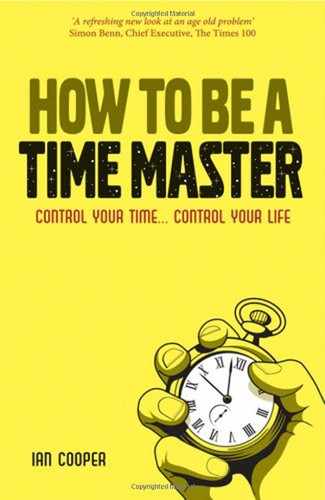You only have a certain number of minutes, hours, days, weeks, months and years. How you choose to spend them influences everything that happens to you.
How much time do you waste each day in useless meetings, on the end of a phone listening to recorded messages, standing in queues, waiting in traffic, sitting on a train, looking for things, reading useless and unwanted emails, getting interrupted, putting things off and battling pointless red tape?
If you could gain at least 24 extra minutes a day by avoiding these time traps, you would have gained 145.6 hours in a year, or six whole days. God made the world in six days and then had a day off. What could you achieve?
So who or what is a Time Master? The key word is control. A Time Master is someone who has mastered the art, the science and the practice of gaining better control over how they spend and manage their life in order to maximize their time. The simple truth is that if you're not in control of your time, other people and circumstances are. Work, friends, family, colleagues, businesses, public bodies and technology all conspire to drain you of your time – but only if you let them.
How to Be a Time Master challenges a number of preconceived notions, myths and traditional views on time management. In a down-to-earth, light, conversational, observational and practical way, it looks not only at some profound issues relating to time, but also at the mundane time traps of everyday life and how to minimize them.
From my research, reading and consultancy over 30 years, I can see that a major shortcoming in many books and courses on time management is that they want you to do everything at once and usually expect you to spend hours defining your life goals; working on expensive and rigid planning systems; creating and completing daily, weekly and monthly charts; clearing your clutter; and learning to do the hardest task first thing in the morning! It's no wonder some people are cynical about time management methods and throw in the towel after their first three days of filling in forms on their new 'time regime'.
In contrast, I don't expect you to start with hours of self-analysis about who you are and where you want to be in five years and I don't believe that one planning system, time management or prioritization method fits all. If you were going on a diet, you would want to find a method that fitted your personality and wouldn't realistically expect to lose all the weight in a day or a week. It's the same with time management issues. It has probably taken you a lifetime of inefficient and unconscious bad time habits and behaviours to achieve your current level of time chaos, disorganization and difficulties.
The good news, however, is that it isn't difficult to make a big difference through some small, simple, practical adjustments that suit your lifestyle and your personal time demands, without the irony of having to devote what little time you do have to wrestling with oversophisticated time management techniques.
In this book I take you through three general stages.
First, I establish what I call the Time Master Truths, a set of guiding principles that you should keep at the back of your mind. As you read these I hope you will recognize yourself in certain situations. These truths will provide the framework and foundation for much of the thinking behind the tips and ideas to come.
Secondly, I offer you a no-frills focus on your major time problems. My view is this: let's simply find the time issue that is causing the most pain for you at the moment and help reduce that. Once that starts to get better, move to the next area and so on.
Thirdly, the book is filled with over 400 practical time tips, pieces of advice and suggestions to help you take control and master your time. Some are in specific sections, while others are grouped together towards the end of the book. The range of issues they deal with is immense, including coping with email overload, dealing with television and Internet addiction, clearing your clutter, travelling, eating out, doing business and many, many others. The book is a treasure chest of practical time tips and you will almost certainly find some nuggets of real value to you.
To give you final food for thought, I have put my Time Master Commandments at the very end of the book. These are the overriding messages that you must grasp and act on if you want to be a Time Master.
Now, before you tell me how simple and obvious some of the material in this book is and that you already know some of its principles, let me say that I used to be very apologetic about their simplicity, until I asked myself an interesting question. If these simple time control and management issues are so obvious and basic, why is it that so few people use them and why are so many struggling with their personal time demons?
Success in becoming a Time Master is not a question of whether or not you already know these strategies, it is whether you can actually do these things and keep doing them – so the simpler the better.
Ian Cooper
www.beatimemaster.com
